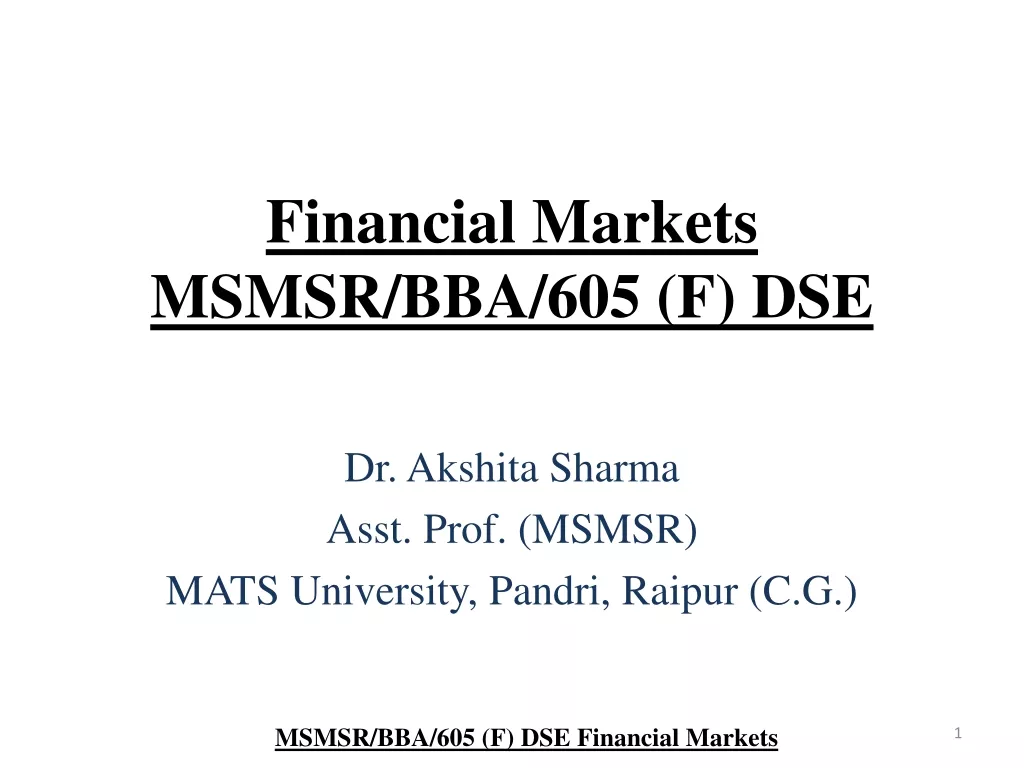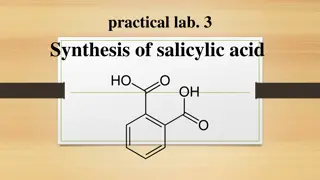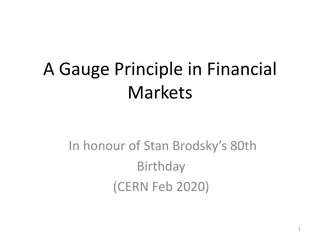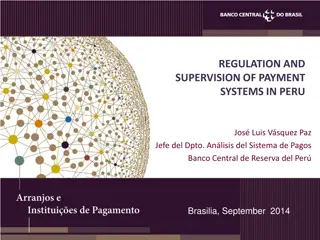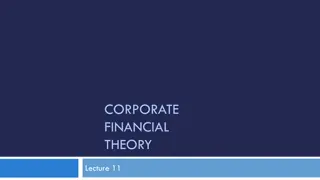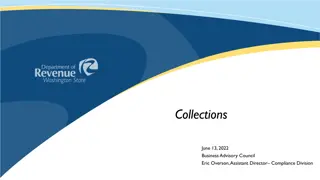The Derivatives Markets Payment Priorities
impact of derivatives, repo agreements, and superpriorities on financial crises through case studies of AIG, Bear Stearns, and Lehman Brothers. Delve into market discipline mechanisms, counterparty risks, and the implications of the Dodd-Frank Act in this insightful analysis.
Download Presentation

Please find below an Image/Link to download the presentation.
The content on the website is provided AS IS for your information and personal use only. It may not be sold, licensed, or shared on other websites without obtaining consent from the author.If you encounter any issues during the download, it is possible that the publisher has removed the file from their server.
You are allowed to download the files provided on this website for personal or commercial use, subject to the condition that they are used lawfully. All files are the property of their respective owners.
The content on the website is provided AS IS for your information and personal use only. It may not be sold, licensed, or shared on other websites without obtaining consent from the author.
E N D
Presentation Transcript
THE DERIVATIVES MARKETS PAYMENT PRIORITIES AS FINANCIAL CRISIS ACCELERATOR AUTHOR: MARK J. ROE PRESENTER: JACKIE LI 9/18/2019
AGENDA Derivatives, Repo, and their Superpriorities AIG, Bear Stearns, and Lehman Brothers Disincentives for Market Discipline Market-Discipline Mechanisms Why Contract Cannot Solve Counterparty Risk Counterarguments and the Author s response Dodd-Frank Act Conclusion and Thoughts Questions
Derivatives Repo Derivatives trade financial outcomes such as those of changing currency rates or of long-term for short-term interest rates. Repurchase agreement The seller promises to buy that asset back, often the next day
BANKRUPTCY CODE Normal Creditors Derivatives and Repo Creditors Sue the debtor for repayment Immediately collect on their debts at the beginning of a bankruptcy Collect debts due from the bankrupt Keep the old debt payments that are made within 90 days before bankruptcy Immediately seize or liquidate security Return payments if are paid in the 90 days before bankruptcy Broader setoff rights on their own debts Set off their own debts Terminate contracts Terminate contracts with the bankrupt Superpriority
3 MEGAFIRMS FAILURES AIG Huge insurer; Big player in the credit default swap market Goldman Sachs: paid insufficient attention to the creditworthiness of AIG After loss of AAA rating, counterparties demanded large collateral postings, and never returned
3 MEGAFIRMS FAILURES Bear Stearns Huge investment bank and securities trader Extensively relied on Repos to finance itself Counterparties unconcerned support due to the Code s repo advantages
3 MEGAFIRMS FAILURES Lehman Brothers Long-lived investment bank J.P. Morgan: froze $ 17 billion of Lehman cash and securities; immediately liquidate the collateral Lehman s other creditors lost more, eg. Reserve Fund
DISINCENTIVES FOR MARKET DISCIPLINE Counterparties have needed skills, but limited incentives Exposed creditors have incentives, but limited skills The priorities reduce counterparty risk Induce stronger players to accept a higher level of derivatives and repo financing with weak counterparties Commercial paper Unsecured policyholders The United States of America as missing creditor
MARKET-DISCIPLINE MECHANISMS By counterparty monitoring By raising prices By dealing only with strong counterparties By reducing exposure to a single counterparty By substituting into stronger financing structures By moving from overnight Repos to longer-term financing By setting better margin coverage earlier By discouraging knife s-edge, systemically dangerous financing
WHY CONTRACT CANNOT SOLVE COUNTERPARTY RISK A large slice of the default risk moves to parties that cannot react contractually The creditor eventually bearing the transferred risk is the United States The Regulatory reaction is needed
COUNTERARGUMENTS AND THE AUTHORS RESPONSE Changing the Code will not change outcomes Counterargument: The strong counterparties expect the government to bail out failed, weak counterparties. They will ignore counterparty risk regardless of the priority rules because the government always step in. Author: Firms are unlikely to fully rely on a government bailout A financial firm may be failing but not be too-big-to-fail Financial players lobbied hard to get derivatives priorities extended
COUNTERARGUMENTS AND THE AUTHORS RESPONSE Derivatives and Repos are vital Counterargument: Repos and derivatives enhance liquidity and risk management, and liquidity and risk management are important for the economy. Author: No reason to favor derivatives and repos over other financial contracts Priority transfers risk to other players who also provide economic benefits May have overused these financial products, due to their favored bankruptcy status
COUNTERARGUMENTS AND THE AUTHORS RESPONSE Are Derivatives and Repos like banking? Counterargument: Derivatives and Repos have become so fundamental to American financial markets that they resemble the bank payment system in their foundational necessity. Author: Derivatives and Repo markets are not widely populated by financially na ve retail bank depositors. The proper regulatory reaction would not be special bankruptcy priorities
DODD-FRANK ACT Mandate a clearinghouse or exchange for many derivatives It s unclear whether the exchange would itself be properly incentivized to handle counterparty risk Many types of derivatives just cannot be handled by a clearinghouse A clearinghouse is a very large netting organization. The risks netted do not disappear, but are borne by the creditors outside the exchange s netting mechanisms A clearinghouse will itself be too-big-to-fail
CONCLUSION AND THOUGHTS Having two sets of rules is unwise The exceptions and superpriorities for the derivatives and repo markets are overly broad and can let counterparties drop their guard The derivatives exceptions increase the incentive of derivatives counterparties to close out their positions Code priorities transfer risks, not eliminate Congress should repeal or reshape the derivatives priorities in Chapter 11
THANK YOU FOR LISTENING QUESTIONS?


